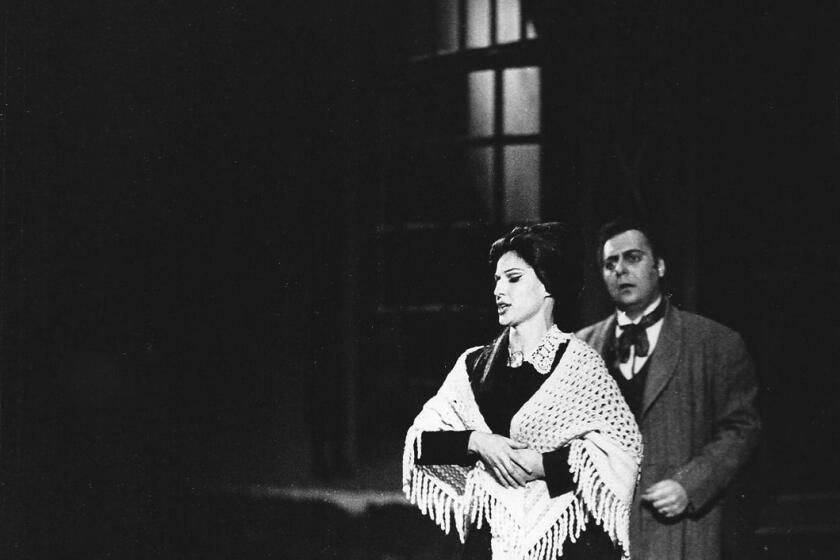San Diego Opera board stands behind new director
The San Diego Opera on Tuesday reaffirmed its commitment to its new general director, David Bennett, despite allegations he contributed to the demise of his former company, the New York-based Gotham Chamber Opera.
“We’ve chosen our new general director, and we are just delighted with the work he’s done here,” San Diego Opera board president Carol Lazier said Tuesday. “The San Diego Opera board stands 100 percent behind David.”
The Gotham Chamber Opera voted last Thursday to cease operations, saying that it had been unaware of the size of the company’s approximately $600,000 accumulated deficit and was unable to raise the funds necessary to continue.
“In early summer, the company’s new executive director, Edward Barnes, uncovered a significant deficit that was not previously disclosed to the board,” the company’s president, Beatrice Broadwater, said. “We do not have, nor do we anticipate having, sufficient donations and pledges that would enable continued operations of the company.”
Bennett said Tuesday that Gotham’s board was aware of the company’s financial situation, which necessitated his and the company’s other two staff members’ salaries being occasionally delayed and board members having to make personal loans to keep the company going.
“I think there was a lack of understanding of financial reporting (on the board),” Bennett said.
Talk of crisis and closure is all too familiar to the San Diego Opera, whose board voted to shut down in March of 2014. It rescinded that vote after more than half the board resigned and the community responded to the opera’s crowd-funding appeal with several million dollars in contributions.
Bennett, Gotham’s managing director, gained a national reputation for presenting innovative opera productions in alternative spaces. He was hired by the San Diego Opera last March to realize the new San Diego Opera board’s vision of a “people’s opera company” that would be responsible to the community.
“David Bennett is someone who absolutely proved himself under really adverse circumstances to be able to put on opera that inspired public attention and good reviews on an absolute shoestring,” said Marc Scorca, the executive director of Opera America, the national service organization for North American opera companies.
“He balanced really limited resources to do really exceptional art, so I have complete confidence in his ability to bring great art to San Diego Opera, supported by the infrastructure and strong policies that the board established in the wake of the departure of Ian and Ann Campbell,” the San Diego Opera’s former leaders.
Scorca, in a phone interview Monday, characterized Gotham Chamber Orchestra as having an “infrastructure deficit” as well as a financial deficit, in which the company’s artistic ambitions were growing faster than its administrative and support structure, creating a situation where the company was constantly on the edge.
According to Barnes, Bennett’s successor, the company had already gone over the edge when he was appointed in May. When Barnes was first confirmed by the board, he said in a phone interview Monday, the board presented him with financial statements that showed debt of approximately $100,000.
But when he got into the office in June, he said he found a different picture: invoices that were not accounted for on the financial statements, bills that were as much as two years overdue, calls from collection agencies. When he added it all up, after contacting the company’s vendors, Barnes said the debt totaled roughly $600,000.
“It was frightening,” he said. “We verified all of that, took it to the board, and we worked all summer long trying to raise money to cover it. I postponed one production we had planned to help save money, but it was not enough, and ultimately we were unable to raise the money to both pay off this past debt and also put on a season.
“We had basically run out cash.”
The Gotham board was intent on raising funds to not only cover the deficit but also fund the season in advance, which totaled $1.8 million to $1.9 million, according to Barnes. And everywhere the company turned, as it worked to raise money over the summer, it encountered the shadow of the recently failed New York City Opera.
“I think people sensed an opera company in financial crisis, and to them it was New York City Opera all over again,” Barnes said, “and they did not want to get involved. They didn’t want to take the risk, which was understandable.”
Although Scorca said it’s unfair to blame Bennett for a “complex situation” that is all too common among smaller opera companies, San Diego’s hiring of Bennett and the Gotham closure have generated plenty of response from former San Diego Opera board members who resigned last year, apparently believing that the right decision was to close the company.
“Quite frankly, after all the promotion and hype about Mr. Bennett’s talents and successes, I was utterly shocked to read the reports from multiple media sources of his alleged financial mismanagement,” Pam Slater-Price said in an email. She’s a former county supervisor and opera executive committee member who now serves on the board of San Diego Theatres, which operates the Civic and the Balboa for the city.
“He apparently concealed unpaid bills and other large debts from his board,” she said. “How the new San Diego Opera board could have hired him without doing an extensive background check is beyond my comprehension.”
(Bennett was recruited through a professional agency, Catherine French Group, which according to Scorca, conducted a thorough background check.)
Slater suggested the opera board hire an independent consultant to look into Bennett’s “past performance” and report to a board subcommittee that would “take action as necessary.”
Lazier, however, is confident the new board, with its focus on governance, has the systems, procedures and people in place that would prevent anything resembling Gotham from happening here.
“What happened at Gotham is their internal issue,” Lazier said. “I don’t think it’s appropriate for the San Diego Opera to get involved in that.”
Get U-T Arts & Culture on Thursdays
A San Diego insider’s look at what talented artists are bringing to the stage, screen, galleries and more.
You may occasionally receive promotional content from the San Diego Union-Tribune.






